The Endocrine Peptides Test Market is estimated to be valued at USD 94.4 billion in 2025 and is projected to reach USD 202.7 billion by 2035, registering a compound annual growth rate (CAGR) of 7.9% over the forecast period.
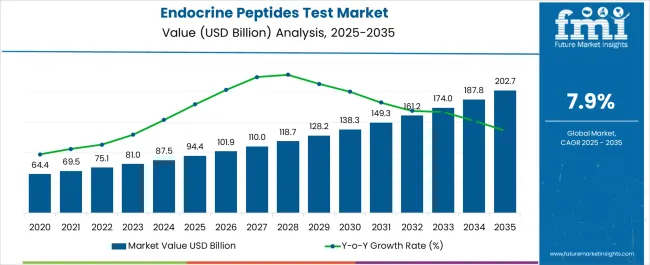
| Metric | Value |
|---|---|
| Endocrine Peptides Test Market Estimated Value in (2025 E) | USD 94.4 billion |
| Endocrine Peptides Test Market Forecast Value in (2035 F) | USD 202.7 billion |
| Forecast CAGR (2025 to 2035) | 7.9% |
The Endocrine Peptides Test market is witnessing steady growth, driven by increasing prevalence of hormonal disorders, reproductive health concerns, and endocrine-related conditions globally. Rising awareness among healthcare providers and patients regarding early diagnosis and monitoring of hormone levels is boosting demand for endocrine peptide testing. Technological advancements in assay development, automation, and high-sensitivity detection methods have improved accuracy, turnaround time, and reliability, enhancing clinical adoption.
Hospitals and diagnostic laboratories are increasingly integrating advanced endocrine testing platforms into routine patient management to support personalized treatment strategies. Growth is further supported by the expanding geriatric population and the rising incidence of reproductive and metabolic disorders that require regular hormonal evaluation.
Regulatory compliance and quality standards in laboratory testing have reinforced confidence in the market, while research investments are contributing to continuous innovation As healthcare providers aim to improve patient outcomes through precise hormonal assessment, the Endocrine Peptides Test market is expected to witness sustained growth, with ongoing advancements in testing accuracy, efficiency, and scalability playing a key role in driving adoption.
The endocrine peptides test market is segmented by test type, end user, and geographic regions. By test type, endocrine peptides test market is divided into Estradiol (E2), Dehydroepiandrosterone Sulfate (DHEAS), Human Chorionic Gonadotropin (HCG), Progesterone, Luteinizing Hormone (LH), Thyroid Stimulating Hormone (TSH), Thyroid Prolactin, and Others. In terms of end user, endocrine peptides test market is classified into Hospitals, Physicians’ Offices, Commercial Laboratories, and Health Care Centers. Regionally, the endocrine peptides test industry is classified into North America, Latin America, Western Europe, Eastern Europe, Balkan & Baltic Countries, Russia & Belarus, Central Asia, East Asia, South Asia & Pacific, and the Middle East & Africa.
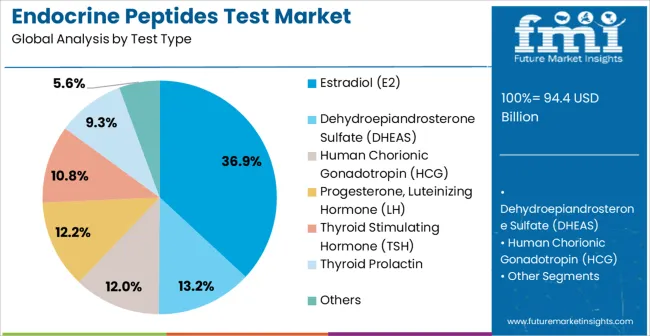
The estradiol (E2) test type segment is projected to hold 36.9% of the market revenue in 2025, positioning it as the leading test type. Growth is being driven by the increasing demand for accurate evaluation of reproductive health, fertility monitoring, and hormonal disorder management. Estradiol testing enables clinicians to assess ovarian function, monitor hormone therapy, and detect endocrine imbalances with high sensitivity and precision.
Advancements in immunoassay techniques and automated detection systems have enhanced test reliability and reduced processing time, which is supporting widespread adoption in clinical settings. The ability to integrate estradiol testing into multi-analyte platforms further improves workflow efficiency and cost-effectiveness.
Research initiatives focused on improving assay performance and minimizing interference from other hormones have reinforced confidence in estradiol tests As reproductive health monitoring and personalized hormone management continue to gain importance, the estradiol test segment is expected to maintain its leading market position, driven by clinical necessity, technological advancement, and growing awareness of endocrine health.
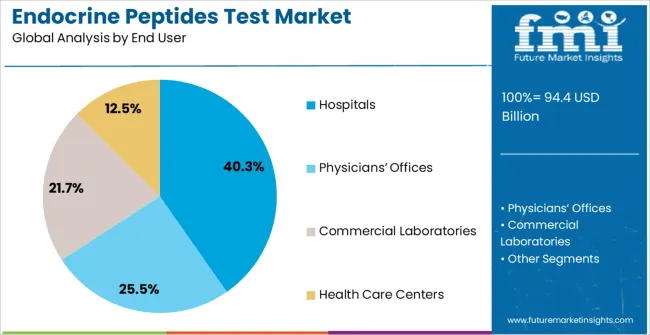
The hospitals end user segment is anticipated to account for 40.3% of the market revenue in 2025, making it the leading end-use category. Growth in this segment is being driven by the increasing reliance of hospitals on comprehensive diagnostic capabilities for patient care, particularly in reproductive medicine, endocrinology, and metabolic disorder management. Hospitals are equipped with advanced laboratory infrastructure, automation, and trained personnel, enabling high-throughput testing and timely results for patient monitoring.
The integration of endocrine peptide testing into routine hospital diagnostics supports accurate treatment planning, therapy monitoring, and early detection of hormonal imbalances. Adoption is also strengthened by hospital-based research programs and partnerships with diagnostic technology providers, which facilitate implementation of the latest testing methodologies.
Regulatory compliance, accreditation standards, and quality control measures in hospitals ensure reliable and consistent testing outcomes As patient demand for precise hormonal evaluation and personalized treatment grows, hospitals are expected to remain the primary driver of market growth, reinforcing their leading position in the Endocrine Peptides Test market.
Endocrine peptide test is used for the measurement of the level of c-peptide present in the blood. C-peptide and insulin are usually found in equivalent amounts. Insulin aids the body to use and regulate the quantity of glucose present in the blood.
The level of c-peptide present in the blood can indicate the amount of insulin made by pancreas. Sugar level in the body does not affect by the C-peptide. C-peptide is also called the connecting peptide. It is a short 31-amino acid polypeptide. Endocrine peptide test can be done when diabetes is just been initiate and it is not clear whether type 1or type 2 diabetes is present.
The test is basically performed to check the type of diabetes present in the body. C-peptide is produced in same amount to insulin. Both c-peptide and insulin are secreted out by the pancreas at the same time and in same quantity. C-peptide is also called as connecting peptide and it is a short 31-amino acid polypeptide. In the pro insulin molecule endocrine peptide connects insulin's A- chain to its B-chain.
It allows the glucose to enter the body cells where it is used for energy .A measurement of c- peptide blood serum level can be used to distinguish between certain diseases with similar clinical features. The test is basically performed to check the type of diabetes present in the body.
This is performed in those patients who are confirmed to have diabetes but are not able to find whether it is type-1or type-2 i.e. diabetes mellitus or diabetes insipedus .The test is also performed to find the cause of blood sugar (hyperglycemia) or a non-cancerous growth (tumor) in the pancreas (insulinoma).
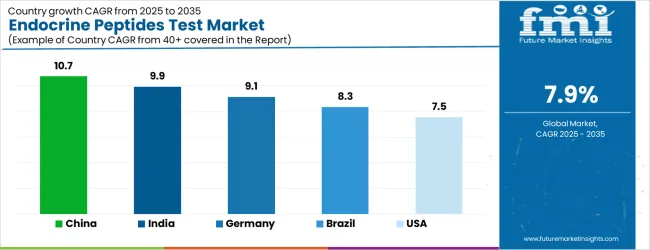
| Country | CAGR |
|---|---|
| China | 10.7% |
| India | 9.9% |
| Germany | 9.1% |
| Brazil | 8.3% |
| USA | 7.5% |
| UK | 6.7% |
| Japan | 6.0% |
The Endocrine Peptides Test Market is expected to register a CAGR of 7.9% during the forecast period, exhibiting varied country level momentum. China leads with the highest CAGR of 10.7%, followed by India at 9.9%. Developed markets such as Germany, France, and the UK continue to expand steadily, while the USA is likely to grow at consistent rates. Japan posts the lowest CAGR at 6.0%, yet still underscores a broadly positive trajectory for the global Endocrine Peptides Test Market. In 2024, Germany held a dominant revenue in the Western Europe market and is expected to grow with a CAGR of 9.1%. The USA Endocrine Peptides Test Market is estimated to be valued at USD 32.3 billion in 2025 and is anticipated to reach a valuation of USD 32.3 billion by 2035. Sales are projected to rise at a CAGR of 0.0% over the forecast period between 2025 and 2035. While Japan and South Korea markets are estimated to be valued at USD 4.4 billion and USD 3.0 billion respectively in 2025.
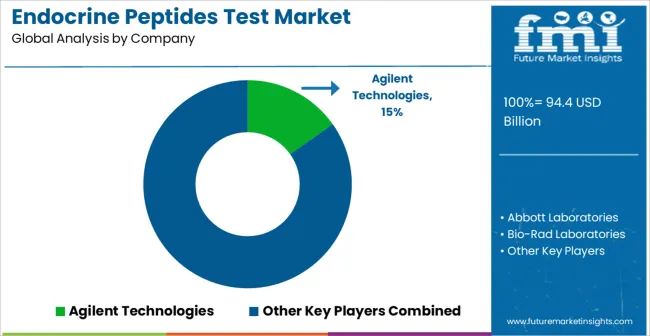
| Item | Value |
|---|---|
| Quantitative Units | USD 94.4 Billion |
| Test Type | Estradiol (E2), Dehydroepiandrosterone Sulfate (DHEAS), Human Chorionic Gonadotropin (HCG), Progesterone, Luteinizing Hormone (LH), Thyroid Stimulating Hormone (TSH), Thyroid Prolactin, and Others |
| End User | Hospitals, Physicians’ Offices, Commercial Laboratories, and Health Care Centers |
| Regions Covered | North America, Europe, Asia-Pacific, Latin America, Middle East & Africa |
| Country Covered | United States, Canada, Germany, France, United Kingdom, China, Japan, India, Brazil, South Africa |
| Key Companies Profiled | Agilent Technologies, Abbott Laboratories, Bio-Rad Laboratories, Hoffman- La Roche Ltd, Siemens AG, Thermo Fischer Scientific Inc., Biomedical Diagnostics, Laboratory Corporation, ImmunoDX, Nano Entek, and BioMerieux |
The global endocrine peptides test market is estimated to be valued at USD 94.4 billion in 2025.
The market size for the endocrine peptides test market is projected to reach USD 202.7 billion by 2035.
The endocrine peptides test market is expected to grow at a 7.9% CAGR between 2025 and 2035.
The key product types in endocrine peptides test market are estradiol (e2), dehydroepiandrosterone sulfate (dheas), human chorionic gonadotropin (hcg), progesterone, luteinizing hormone (lh), thyroid stimulating hormone (tsh), thyroid prolactin and others.
In terms of end user, hospitals segment to command 40.3% share in the endocrine peptides test market in 2025.






Our Research Products

The "Full Research Suite" delivers actionable market intel, deep dives on markets or technologies, so clients act faster, cut risk, and unlock growth.

The Leaderboard benchmarks and ranks top vendors, classifying them as Established Leaders, Leading Challengers, or Disruptors & Challengers.

Locates where complements amplify value and substitutes erode it, forecasting net impact by horizon

We deliver granular, decision-grade intel: market sizing, 5-year forecasts, pricing, adoption, usage, revenue, and operational KPIs—plus competitor tracking, regulation, and value chains—across 60 countries broadly.

Spot the shifts before they hit your P&L. We track inflection points, adoption curves, pricing moves, and ecosystem plays to show where demand is heading, why it is changing, and what to do next across high-growth markets and disruptive tech

Real-time reads of user behavior. We track shifting priorities, perceptions of today’s and next-gen services, and provider experience, then pace how fast tech moves from trial to adoption, blending buyer, consumer, and channel inputs with social signals (#WhySwitch, #UX).

Partner with our analyst team to build a custom report designed around your business priorities. From analysing market trends to assessing competitors or crafting bespoke datasets, we tailor insights to your needs.
Supplier Intelligence
Discovery & Profiling
Capacity & Footprint
Performance & Risk
Compliance & Governance
Commercial Readiness
Who Supplies Whom
Scorecards & Shortlists
Playbooks & Docs
Category Intelligence
Definition & Scope
Demand & Use Cases
Cost Drivers
Market Structure
Supply Chain Map
Trade & Policy
Operating Norms
Deliverables
Buyer Intelligence
Account Basics
Spend & Scope
Procurement Model
Vendor Requirements
Terms & Policies
Entry Strategy
Pain Points & Triggers
Outputs
Pricing Analysis
Benchmarks
Trends
Should-Cost
Indexation
Landed Cost
Commercial Terms
Deliverables
Brand Analysis
Positioning & Value Prop
Share & Presence
Customer Evidence
Go-to-Market
Digital & Reputation
Compliance & Trust
KPIs & Gaps
Outputs
Full Research Suite comprises of:
Market outlook & trends analysis
Interviews & case studies
Strategic recommendations
Vendor profiles & capabilities analysis
5-year forecasts
8 regions and 60+ country-level data splits
Market segment data splits
12 months of continuous data updates
DELIVERED AS:
PDF EXCEL ONLINE
Endocrine Testing Market Size and Share Forecast Outlook 2025 to 2035
Test and Measurement Equipment Market Size and Share Forecast Outlook 2025 to 2035
Testosterone Test Market Size and Share Forecast Outlook 2025 to 2035
Test rig Market Size and Share Forecast Outlook 2025 to 2035
Test and Measurement Sensors Market Size and Share Forecast Outlook 2025 to 2035
Testing, Inspection & Certification Market Growth – Trends & Forecast 2025 to 2035
Testosterone Booster Industry Analysis by Component, Source, Distribution Channels and Regions 2025 to 2035
Testosterone Injectable Market
Test Tube Market
Testliner Market
Testicular Cancer Treatment Market
Intestinal Health Pet Dietary Supplement Market Size and Share Forecast Outlook 2025 to 2035
Intestinal Pseudo-Obstruction Treatment Market - Trends, Growth & Forecast 2025 to 2035
Intestinal Fistula Treatment Market Growth - Demand & Innovations 2025 to 2035
5G Testing Market Size and Share Forecast Outlook 2025 to 2035
AB Testing Software Market Size and Share Forecast Outlook 2025 to 2035
RF Test Equipment Market Size and Share Forecast Outlook 2025 to 2035
5G Testing Equipment Market Analysis - Size, Growth, and Forecast 2025 to 2035
5G Tester Market Growth – Trends & Forecast 2019-2027
RF Tester Market Growth – Trends & Forecast 2019-2027

Thank you!
You will receive an email from our Business Development Manager. Please be sure to check your SPAM/JUNK folder too.
Chat With
MaRIA